九年级英语词性词形变化
英语词性转换

英语单词词性转换的基本规律.动词(v.)→名词(n.)(a)词形不变,词性改变例如:work, study, water, plant等可以用作动词(工作,学习,浇水,种植),也可以用作名词(工作,学习,水,植物).(b)一些动词在词尾加上-er或-or之后就变成了表示"某一类人"的名词例如:work—worker, teach—teacher, sing—singer,jump—jumper, play—player, learn—learner,visit—visitor, invent—inventor,collect—collector等. 注意:1)以不发音的e结尾的动词,在词尾加-r.例如:drive—driver, write—writer等.2)以重读闭音节结尾,且末尾只有一个辅音字母的动词,应双写末尾的辅音字母,再加-er例如:run—runner, win—winner,begin—beginner 等.(c)在动词词尾加上-ment 变成名词例如:achieve—achievement (成就)advertise—advertisement//advertising(广告)agree—agreement disgree—disagreement amuse—amusement (娱乐) improve—improvement(争吵)commit(奉献)—commitment develop—development (发展)depart—department (局,部) govern(统治)—government(政府)manage—management (管理) equip—equipment (装备)有些单词比较特殊,需把动词后的e去掉再加ment.例如:argue—argument(争论)(d)在动词词尾加上-(t)ion/(s)ion变成名词例如: attract—attraction; instruct—instruction;invent—invention discuss—discussion;express—expression educate—education;graduate—graduation; operate—operation (去e再加"ion") compete—competition; organize—organization (把e改成其他字母再加"tion")decide—decision conclude—conclusion (把de改为s再加"ion")describe—description描写,描绘(这是特例,不规则变化) (e)在动词词尾加上-ance变成名词例如: appear—appearance (外貌;出现)perform—performance (演出)accept—acceptance (接受)(f)在动词词尾加-ing变成名词(方法与动词变为现在分词的方法相同)例如:meet—meeting build—building wait—waitingbathe—bathing say—saying(谚语) mean —meaningend —ending train —training wash—washing注意:以重读闭音节结尾,且末尾只有一个辅音字母的动词,应双写末尾的辅音字母,再加-ing如:swim—swimming shop—shopping begin—beginning(g)其他一些比较特殊的变化例如: Beg(乞讨)—beggar(乞丐) behave(行为举止)—behaviorknow(知道)—knowledge(知识) fly—flight (飞行)heat (加热)—heat(热量) hit (撞击)—hit( 轰动一时的人或物,碰撞)mix (混合)—mixture(混合物) press(按,压)—pressure(压力)sit(坐)—seat (座位) succeed—success(成功)tour—tour(旅游)/ tourist (游客)2.动词(v.)→形容词(adj.)(a)动词后面加able,以e结尾的动词则去e加able,表示具有此性质,特点或属性.例如: afford-affordable;love-lovable(b)动词后面加ed,以e结尾的动词则直接加d,表示被动性的属性或特点.例如: scatter-scattered use-used(c)不规则的动词则必须记忆,记住其过去分词形式.规律不大,意义同(b).3.名词(n.)→形容词(adj.)(a)在名词后面加-y可以变成形容词(尤其是一些与天气有关的名词)例如: rain—rainy, cloud—cloudy, wind—windy, snow—snowy, health—healthy, luck—lucky,anger—angry guilt—guilty(内疚的)tourist—touristy(游客多的) , salt (盐)—salty (咸的)silk(丝绸)—silky(丝绸般的), sleep—sleepy (昏昏欲睡的)注意:1)如果以重读闭音节结尾,且词尾只有一个辅音字母,这时应双写辅音字母再加"-y".如: sun—sunny, fun—funny, fog—foggy(有雾的), fur—furry(毛皮的)2)少数以不发音的e结尾的名词变为形容词时,应去掉e 再加"-y".如: noise—noisy, ice—icy, shine—shiny(发亮的), taste(口味)—tasty(甜的)(b)名词后面加-ed,以e结尾的直接加d.例如: spot(斑点)—spotted(有斑点的); talent—talented (有天赋的)organize—organized 有组织的; balance—balanced(平衡的)(c)一些抽象名词在词尾加-ful可以变为形容词例如:care—careful, thank—thankful, help—helpful, use—useful, meaning—meaningful(d)在名词后加-less构成含有否定意义的形容词例如:care—careless(粗心的), use—useless(无用的)hope—hopeless(没希望的),home—homeless(无家可归的) (e)一些以-ce结尾的名词,把-ce改为-t变成形容词例如: difference—different, silence—silent, confidence—confident(f).在名词后加-ly变为形容词例如: friend—friendly, love—lovely, live---lively(g).在名词后加-ous变为形容词例如: danger—dangerous(h)名词后面加-al变为形容词例如: music—musical; medicine—medical (这个比较特殊) (i)名词后面加-able变为形容词,如果以e结尾就去e再加"-able".例如: adjust—adjustable 可调整的value—valuable有价值的(j)名词后面加-en变成形容词例如: wood—wooden 木制的wool—woolen 羊毛的(k)一些表示国家的名词可以在词尾加-ese, -ish或-n构成表示国籍,语言的形容词例如:China—Chinese, Japan—Japanese, England—English,America—American, India—Indian, Australia —Australian(注意Canada—Canadian)4..形容词(adj.)→副词(adv.)▲一般在形容词的词尾加-ly可以变成副词例如: quick—quickly, slow—slowly, loud—loudly, sudden—suddenly 等但是,以下几点值得注意:(a) 一些以"辅音字母+y"结尾的形容词,要把y改为i再加-ly 例如: happy—happily, angry—angrily, lucky—luckily, heavy—heavily, noisy—noisily(b) 有些以-ble或-le结尾的形容词,去掉e加-y例如:possible—possibly, terrible—terribly(c)少数以e结尾的形容词,要去掉e再加-ly例如: true—truly但绝大多数以e结尾的形容词仍然直接加-ly 例如: polite—politely, wide—widely(d)以-l结尾的形容词变为副词时要在词尾加-ly,以-ll结尾的才在词尾只加-y.例如: usual—usually, careful—carefully, useful—usefullyfull—fully (以-ll结尾的才只加y)OK,以上就是英语单词词性变化的一般规律,希望对大家有所帮助PS:有些同学可能对元音辅音以及重读闭音节不是很了解,那我在这里再做下补充说明.1.英语26个字母中,a e i o u是元音字母, y是半元音字母, 其余都是辅音字母.★所谓半元音就是有时候做元音,有时候做辅音.半元音字母y做元音有: shy,sky做辅音比如最简单的:yes2.开音节和闭音节开音节分两种:绝对开音节和相对开音节绝对开音节指的是"元音字母结尾"的音节(例如we, hi等) 相对开音节是指"辅音字母-元音字母-辅音字母-不发音的e"的音节,(r除外). ( 例如,take,make等)比如:take (在这个单词中,t是辅音,a是元音,k是辅音,e是不发音的元音)◆在开音节中, 元音字母发他们在字母表中的音闭音节, 则是指"辅音字母-元音字母-辅音字母"的音节( -al 等除外) (例如:leg,cross等)◆在闭音节中,元音字母发不同的音a e i o u例sat let sit not nut (试着读下这些单词,这些单词中,元音发的音都不是它们在字母表中发的音)2.英语重读闭音节就是以辅音因素结尾的,而且是重读音节的音节.比如apple 划音节就因该是ap/ple 前面那个ap是一个音节,这个音节以辅音因素p结尾,所以就是闭音节.(仅仅能看出是闭音节,是不是重读闭音节还要看这个音节是不是重读的) 重读闭音节三要素:1. 必须是重读音节;2. 最后只有一个辅音字母;3.元音字母发短元音( 说通俗点,打个比方, /u/是短元音,/u:/是长元音)重读闭音节即两个辅音中间夹一个元音.如:sit---sitting begin---beginning(重读在gin这个音节上)●像travel这个单词,"vel"也是"辅音+元音+辅音"的结构,但是重音不在vel这个音节上,所以不用双写"l",可以为travelled,也可以是traveled,更常用的是后者.英语单词词根词缀和词性转换英语中常见的后缀一、名词性后缀1,-age为抽象名词后缀,表示行为,状态和全体总称percentage百分数,百分率,voltage电压,伏特数,lavage灌洗,洗,出法,gavage管词法,curettage刮除法,shortage不足,缺少。
中考英语复习语法知识讲解(词性句子成分句子划分简单句结构)

中考英语语法知识讲解一、词性【实词】名词、代词、动词、形容词、副词、数词实词是指实在意义,能独立承担句子成分的词,实词有词形的变化。
【虚词】冠词、介词、连词、感叹词与实词相对,虚词没有实在意义,不能独立承担句子成分,虚词没有词形的变化。
1、名词(n.)表示人、事物、地点或抽象概念的名称。
[例]boy, morning, orange, clock, etc.2、代词(pron.)主要用来代替名词。
[例]who, she, you, it, etc.3、形容词(adj.)表示人或事物的性质或特征。
[例]good, white, orange, ugly, etc.4、数词(num.)表示数量或事物的顺序。
[例]one, two, three, hundred, etc.5、动词(v.)表示动作或状态。
[例]am, is, think, does, may, etc.6、副词(adv.)修饰动词、形容词、副词,说明时间、地点、程度等。
[例]now, often, slowly, home, hard, very, really, etc.7、冠词(art.)用在名词前,帮助说明名词。
[例]a, an, the.8、介词(prep.)表示它后面的名词或代词与其他句子成分的关系。
[例]in, on, at, from, above, under, behind, with, without, to, etc.9、连词(conj.)用来连接词、短语或句子。
[例]and, or, before, when, while, after, as soon as, if, unless, until, because, so, though, but, even if, even though, as if, etc.10、感叹词(interj.)表喜、怒、哀、乐等感情。
[例]oh, well, hi, hello, etc.二、句子成分1、主语句子所要说的人或事物,回答是“谁”或者“什么”。
中考英语词汇词形变化总结

中考英语词汇词形变化总结英语词汇的词形变化是学习英语的重要一环,掌握好不同词形的用法可以帮助我们更准确地表达自己的意思。
在中考英语考试中,词汇词形变化也是经常出现的考点之一。
本文将对中考英语常见的词汇词形变化进行总结,以帮助同学们提高应对这一考点的能力。
一、名词的词形变化1. 单数名词变复数名词:大部分名词的复数形式是在其词尾加-s 或-es,如book-books, box-boxes, brush-brushes等。
但是也有一些特殊情况需要注意:- 以辅音字母+y结尾的名词,将-y变为-i,再加-es,如baby-babies, country-countries。
- 以-s, -sh, -ch, -x结尾的名词,在其词尾加-es,如bus-buses, dish-dishes, watch-watches, box-boxes。
- 以-o结尾的名词,在其词尾加-es,如potato-potatoes, tomato-tomatoes。
- 以-f或-fe结尾的名词,将-f或-fe变为-ves,如leaf-leaves, knife-knives。
2. 可数名词变不可数名词:有些名词可以同时作为可数名词和不可数名词,表示单个事物时用作可数名词,表示一类事物时用作不可数名词。
例如,water可以表示一杯水(可数名词),也可以表示水这一类物质(不可数名词)。
3. 名词的单数形式:- 有些名词没有复数形式或者复数形式与单数形式相同,如sheep, fish, Chinese等。
- 有些名词形式变化不规则,如man-men, woman-women, tooth-teeth 等。
二、动词的词形变化1. 动词的时态变化:英语动词的时态变化较为复杂,常见的时态有一般现在时、一般过去时、一般将来时、现在进行时、过去进行时等。
- 一般现在时的基本形式为动词原形,表示经常性或普遍性的动作或状态,如I eat breakfast every day.(我每天吃早饭。
英语单词词性转变的一般规律
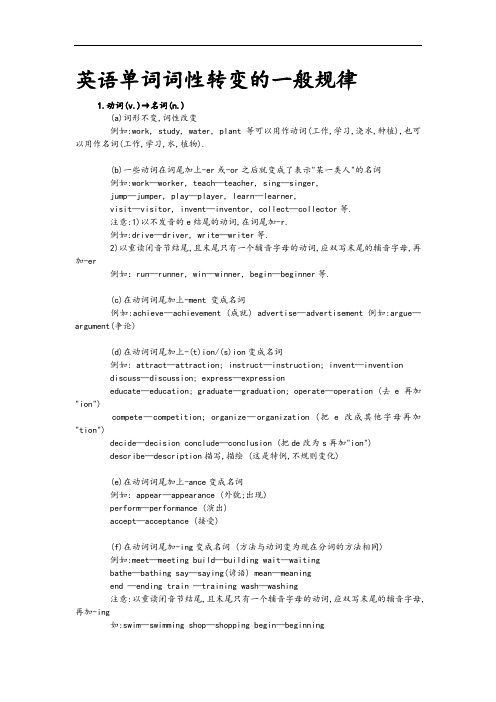
英语单词词性转变的一般规律1.动词(v.)→名词(n.)(a)词形不变,词性改变例如:work, study, water, plant等可以用作动词(工作,学习,浇水,种植),也可以用作名词(工作,学习,水,植物).(b)一些动词在词尾加上-er或-or之后就变成了表示"某一类人"的名词例如:work—worker, teach—teacher, sing—singer,jump—jumper, play—player, learn—learner,visit—visitor, invent—inventor, collect—collector等.注意:1)以不发音的e结尾的动词,在词尾加-r.例如:drive—driver, write—writer等.2)以重读闭音节结尾,且末尾只有一个辅音字母的动词,应双写末尾的辅音字母,再加-er例如:run—runner, win—winner, begin—beginner等.(c)在动词词尾加上-ment 变成名词例如:achieve—achievement (成就) advertise—advertisement例如:argue—argument(争论)(d)在动词词尾加上-(t)ion/(s)ion变成名词例如: attract—attraction; instruct—instruction; invent—inventiondiscuss—discussion; express—expressioneducate—education; graduate—graduation; operate—operation (去e再加"ion")compete—competition; organize—organization (把e改成其他字母再加"tion")decide—decision conclude—conclusion (把de改为s再加"ion")describe—description描写,描绘 (这是特例,不规则变化)(e)在动词词尾加上-ance变成名词例如: appear—appearance (外貌;出现)perform—performance (演出)accept—acceptance (接受)(f)在动词词尾加-ing变成名词 (方法与动词变为现在分词的方法相同)例如:meet—meeting build—building wait—waitingbathe—bathing say—saying(谚语) mean—meaningend —ending train —training wash—washing注意:以重读闭音节结尾,且末尾只有一个辅音字母的动词,应双写末尾的辅音字母,再加-ing如:swim—swimming shop—shopping begin—beginning(g)其他一些比较特殊的变化例如: Beg(乞讨)—beggar(乞丐) behave(行为举止)—behaviorknow(知道)—knowledge(知识) fly—flight (飞行)heat (加热)—heat(热量) hit (撞击)—hit( 轰动一时的人或物,碰撞)mix (混合)—mixture(混合物) press(按,压)—pressure(压力)sit(坐)—seat (座位) succeed—success(成功)tour—tour(旅游)/ tourist (游客)2.动词(v.)→形容词(adj.)(a)动词后面加able,以e结尾的动词则去e加able,表示具有此性质,特点或属性.例如: afford-affordable;love-lovable(b)动词后面加ed,以e结尾的动词则直接加d,表示被动性的属性或特点.例如: scatter-scattereduse-used(c)不规则的动词则必须记忆,记住其过去分词形式.规律不大,意义同(b).3.名词(n.)→形容词(adj.)(a)在名词后面加-y可以变成形容词(尤其是一些与天气有关的名词)例如: rain—rainy, cloud—cloudy, wind—windy, snow—snowy,health—healthy, luck—lucky, anger—angry guilt—guilty(内疚的)tourist—touristy(游客多的) , salt (盐)—salty (咸的)silk(丝绸)—silky(丝绸般的), sleep—sleepy (昏昏欲睡的)注意:1)如果以重读闭音节结尾,且词尾只有一个辅音字母,这时应双写辅音字母再加"-y".如: sun—sunny, fun—funny, fog—foggy(有雾的), fur—furry(毛皮的)2)少数以不发音的e结尾的名词变为形容词时,应去掉e再加"-y".如: noise—noisy, ice—icy, shine—shiny(发亮的), taste(口味)—tasty(甜的)(b)名词后面加-ed,以e结尾的直接加d.例如: spot(斑点)—spotted(有斑点的); talent—talented (有天赋的)organize—organized 有组织的; balance—balanced(平衡的)(c)一些抽象名词在词尾加-ful可以变为形容词例如:care—careful, thank—thankful, help—helpful,use—useful, meaning—meaningful(d)在名词后加-less构成含有否定意义的形容词例如:care—careless(粗心的), use—useless(无用的)hope—hopeless(没希望的),home—homeless(无家可归的)(e)一些以-ce结尾的名词,把-ce改为-t变成形容词例如: difference—different, silence—silent, confidence—confident(f).在名词后加-ly变为形容词例如: friend—friendly, love—lovely, live---lively(g).在名词后加-ous变为形容词例如: danger—dangerous(h)名词后面加-al变为形容词例如: music—musical; medicine—medical (这个比较特殊)(i)名词后面加-able变为形容词,如果以e结尾就去e再加"-able".例如: adjust—adjustable 可调整的value—valuable有价值的(j)名词后面加-en变成形容词例如: wood—wooden 木制的wool—woolen 羊毛的(k)一些表示国家的名词可以在词尾加-ese, -ish或-n构成表示国籍,语言的形容词例如:China—Chinese, Japan—Japanese, England—English,America—American, India—Indian, Australia —Australian(注意Canada—Canadian)4..形容词(adj.)→副词(adv.)▲一般在形容词的词尾加-ly可以变成副词例如: quick—quickly, slow—slowly, loud—loudly, sudden—suddenly 等但是,以下几点值得注意:(a) 一些以"辅音字母+y"结尾的形容词,要把y改为i再加-ly例如: happy—happily, angry—angrily, lucky—luckily, heavy—heavily, noisy—noisily(b) 有些以-ble或-le结尾的形容词,去掉e加-y例如:possible—possibly, terrible—terribly(c)少数以e结尾的形容词,要去掉e再加-ly例如: true—truly但绝大多数以e结尾的形容词仍然直接加-ly 例如: polite—politely, wide—widely(d)以-l结尾的形容词变为副词时要在词尾加-ly,以--ll结尾的才在词尾只加-y.例如: usual—usually, careful—carefully, useful—usefullyfull—fully (以-ll结尾的才只加y)英语词汇后缀系列(一)——形容词后缀able以“-able”结尾的形容词一般有两种情况:(1)v.+able→adj. 以这种方式构成的形容词其意义为“能……的”、“可以(被)……的”、“适合于……的”、“值得……的”等,即有被动含义。
九年级词性转换及重要短语1-10

2. n.发展v发展adi.发达的adj.发展中的3.v认识到,意识到,实现adi.真实的4. v.记忆,背诵n. 记忆,背诵5. adi.口语的v.说,讲6. v.解决n. 解决方法7. adv.大声地,出生地adj.大声的adv.大声地,响亮地8. adj.快的,迅速的adv.快地,迅速地9. adj.聪明的adv.聪明地10. n.兴趣v使…感兴趣adi.有兴趣的adj.感兴趣的11. v.表达n.表达、12. n.成功v成功adi.成功的adv .成功地、词组;1.范语法错误 2.在字典中查阅新单词3.使发音正确 4. 用英语记日记5.通过学习小组学习6.做笔记7.那样学到很多/很少8.那样有很大的/没什么帮助9.朗读,大声读10.做单词卡11.听磁带12. 向老师求助13.看录像14.练习发音15.太…而不能…16.为考试而学习17.懂得英语口语18.提高说的技能19.学习语言的秘诀20. 爱上…喜欢上…21.肢体语言22.小菜一碟23.以便于24.记忆句型25.加快阅读速度26.加入英语俱乐部27.是否28. 熟能生巧29. 寻找30.依赖于;取决于31.共有;与…相同32.害怕…恐怕…33. 担忧;担心34.一点一点地35.编对话36.一遍又一遍,反复1. adi.奇怪的,陌生的n.陌生人2. n.传统adi.传统的3. v招待;请(客)n.款待;招待n.治疗,疗法;处理,待遇,对待4. n.记忆,背诵n.记忆,背诵5. adi.口语的V.说,讲6..v放置,安放;产卵,下蛋过去式过去分词现在分词7. v.存在,平躺;处于过去式过去分词现在分词8. adi.死的,去世的v.死亡,去世n.死亡9. v.处罚,惩罚n. 处罚,惩罚10. adi.温暖的,温和的adv.温暖地;亲切地;热烈地n. 温暖,暖和11. n. 运气adi.幸运地adv. 不幸地12. v.意思是,意味着n. 意思,意义adi.有意义的adi.吝啬的;小气的自私的重点词组;1.泼水节2.端午节3.春节4.元宵节5.吃粽子6.走访亲戚7.增加(体重),发胖8.摆开,布置9…与……相似10.有好运11.庆祝中秋节12.传统民间故事13.最终成为14.母亲节15.父亲节16.圣诞老人17.作为结果18.飞上天19.一个……另一个……20.乔装改扮21.不招待纠结捣乱22.圣诞精神,圣诞节的意义23.分享及给予爱和快乐的重要性24.使…记起,使…想起25.传播爱与欢乐26…….的开始27.不但……而且……28.给予生命29.在……和……两者之间30…….的象征31.鬼屋1. v.原谅n. 借口2. v.骑,乘n.供玩乐的乘坐工具3. adi.贵的,昂贵的adi.不贵的4. adi.拥挤的adi.不拥挤的5. adi.直接的adi.不直接的6. n.公园v.停车n.停车7.adi.有礼貌的adv.有礼貌地adi.没礼貌的8. adi.可能的adv.可能地重点词组:1.取些钱2.买些杂志3.获取有关这个城市的信息4.买一些邮票5.沿着中心大街走6.去三楼7.向左/右转8.在……和……之间9.路过书店10.游乐园11.加油12.路过13.在某人去……的路上14.寄一封信15.在购物中心16.有礼貌地求助17.一个直接的问题18.改变方式19.在不同的状况下20.依靠,依赖,取决于21.使用切当的语言22.花时间/钱做某事23.递盐24.期盼;期望25.在三层26.急忙,匆匆忙忙地2. v描述,描写n. 描述,描写3. adj有趣的,搞笑的n.乐趣;娱乐活动;嬉戏;嬉闹;有趣的事adi.使人愉快的;开心的4. adi.沉默的n. 沉默5. adi.幽默的n..幽默6. v.采访n. 面试者;会见者;采访者;7. n.欧洲adj.欧洲的;全欧的;欧盟的n.欧洲人;祖籍欧洲人的;欧洲人的后裔;欧盟支持者;欧盟拥护者8.n.自豪;骄傲;adj.自豪的,骄傲的9. v.决定n.决定10. v建议n.建议11. adj.害羞的n.害羞、词组;1.过去常常 2.直发3.不时;偶尔;间或;时而4. 变红5.取得好成绩6.不再7.向左\ 右转8.开始从事;接受(提议);占用9.担忧;担心10.被众人所关注;吸引无数目光11.放弃12. 许多;大量13.单独14.听流行音乐15.在公众面前做演讲16.在足球对17.一个普通的15岁男孩18.以……骄傲;以……而自豪19.以……为骄傲20. 一所寄宿制学校21.亲自22.引发问题23.缺课24.在最近的几年中25.在英语比赛中获胜26.害怕adi用过的,用旧了的;习惯于;二手的;筋疲力尽的adi.有用的2. n历史adi.历史的,有关历史研究的;有根据的;基于史实的3. v将(某物)切开(或分割)adi.锋利的,锐利的;刺骨的;像刀割似的;讽刺的n.切割,剪报,剪辑v.(现在分词)切开,消减,采伐。
Unit13-14单元单词词形变化形式 人教版九年级英语全册
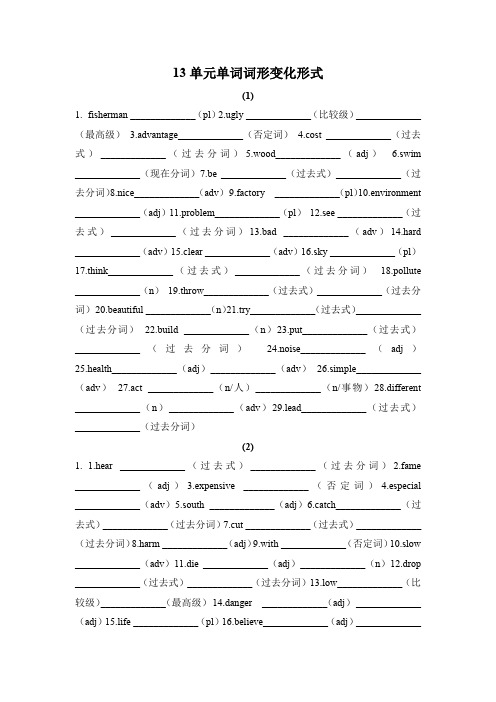
13单元单词词形变化形式(1)1.fisherman _____________(pl)2.ugly _____________(比较级)_____________(最高级)3.advantage_____________(否定词)4.cost _____________(过去式)_____________(过去分词)5.wood_____________(adj)6.swim _____________(现在分词)7.be _____________(过去式)_____________(过去分词)8.nice_____________(adv)9.factory _____________(pl)10.environment _____________(adj)11.problem_____________(pl)12.see _____________(过去式)_____________(过去分词)13.bad _____________(adv)14.hard _____________(adv)15.clear _____________(adv)16.sky _____________(pl)17.think_____________(过去式)_____________(过去分词)18.pollute _____________(n)19.throw_____________(过去式)_____________(过去分词)20.beautiful _____________(n)21.try_____________(过去式)_____________(过去分词)22.build _____________(n)23.put_____________(过去式)_____________(过去分词)24.noise_____________(adj)25.health_____________(adj)_____________(adv)26.simple_____________(adv)27.act _____________(n/人)_____________(n/事物)28.different _____________(n)_____________(adv)29.lead_____________(过去式)_____________(过去分词)(2)1. 1.hear _____________(过去式)_____________(过去分词)2.fame _____________(adj)3.expensive _____________(否定词)4.especial _____________(adv)5.south _____________(adj)6.catch_____________(过去式)_____________(过去分词)7.cut _____________(过去式)_____________(过去分词)8.harm _____________(adj)9.with _____________(否定词)10.slow _____________(adv)11.die _____________(adj)_____________(n)12.drop _____________(过去式)_____________(过去分词)13.low_____________(比较级)_____________(最高级)14.danger _____________(adj)_____________(adj)15.life _____________(pl)16.believe_____________(adj)_____________(否定词)17.she _____________(名词性物主代词)_____________(反身代词)18.they _____________(名词性物主代词)_____________(反身代词)19.fall _____________(过去式)_____________(过去分词)20.protect _____________(n)21.teach_____________(过去式)_____________(过去分词)_____________(n)22.develop _____________(n)23.stop_____________(过去式)_____________(过去分词)_____________(现在分词)24.sell _____________(过去式)_____________(过去分词)25.science _____________(adj)26.show _____________(过去式)_____________(过去分词)27.eat_____________(过去式)_____________(过去分词)28.appear _____________(否定词)29.do _____________(过去式)_____________(过去分词)30.agree_____________(过去分词)31.difficult _____________(n)32.child _____________(pl)(3)1.ride_____________(过去式)_____________(过去分词)2.light _____________(pl)3.napkin _____________(pl)4.real _____________(adv)5.easy _____________(否定词)_____________(adv)6.shop _____________(过去式)_____________(过去分词)_____________(现在分词)7.true_____________(adv)_____________(n)e _____________(adj)9.take_____________(过去式)_____________(过去分词)10.write _____________(过去式)_____________(过去分词)_____________(n)11.close _____________(比较级)_____________(最高级)(4)1.actual _____________(adv)2.create _____________(n)3.probable_____________(adv)ual _____________(adv)5.build _____________(n)6.she _____________(名词性物主代词)_____________(反身代词)7.build _____________(过去式)_____________(过去分词)8.bottle _____________(pl)9.recent _____________(adv)10.win_____________(过去式)_____________(过去分词)_____________(n)11.inspire_____________(n)12.recycle _____________(现在分词)13.be _____________(过去式)_____________(过去分词)14.sell _____________(过去式)_____________(过去分词)15.set_____________(过去式)_____________(过去分词)16.especial_____________(adv)e _____________(adj)18.plan _____________(过去式)_____________(过去分词)_____________(现在分词)19.write _____________(过去式)_____________(过去分词)20.enjoy_____________(adj)21.busy _____________(n)22.know_____________(过去式)_____________(过去分词)23.material _____________(pl)24.beautiful _____________(n)25.human _____________(pl)26.German _____________(pl)27.important _____________(n)28.environment _____________(adj)29.protect _____________(n)30.bring_____________(过去式)_____________(过去分词)31.happy_____________(n)_____________(adv)32.life _____________(pl)33.create _____________(adj)34.child_____________(pl)35.suggest _____________(n)36.possible _____________(adv)37.health _____________(adj)_____________(adv)38.different _____________(n)39.wide _____________(adv)40.sudden _____________(adv)14单元单词词形变化形式(1)1.survey _____________(pl)2.standard _____________(pl)3.method _____________(pl)4.instruction _____________(pl)5.memory_____________(pl)6.special _____________(adv)7.find_____________(过去式)_____________(过去分词)8.careful _____________(adv)9.scare_____________(adj/人)_____________ (adj/物)10.end_____________(n)11.give _____________(过去式)_____________(过去分词)12.safe _____________(adv)_____________ (n)13.hurt _____________(过去式)_____________(过去分词)14.break _____________(过去式)_____________(过去分词)15.run_____________(过去式)_____________(过去分词)_____________(现在分词)16.good_____________(比较级)_____________(最高级)e_____________(过去式)_____________(过去分词)18.university _____________(pl)19.medicine _____________(adj)20.win _____________(过去式)_____________(过去分词)_____________(n)21.experience _____________(pl)22.goal _____________(pl)pete_____________(n/人)_____________ (n/事物)24.advise _____________(v)25.health_____________(adj)_____________(adv)26.hurt _____________(过去式)_____________(过去分词)27.patient _____________(n)28.you _____________(名词性物主代词)_____________(反身代词)29.difficult _____________(n)30.clear _____________(adv)31.understand _____________(过去式)_____________(过去分词)32.courage _____________(v)33.get _____________(过去式)_____________(过去分词)34.they _____________(名词性物主代词)_____________(反身代词)(2)1.overcome _____________(过去式)_____________(过去分词)2.graduate_____________(n)3.care _____________(adj)_____________(adj)_____________(否定词)4.we_____________(名词性物主代词)_____________(反身代词)5.write _____________(n)6.ring _____________(过去式)_____________(过去分词)7.excite _____________(n)8.pride _____________(adj)9.shy _____________(比较级)_____________(最高级)_____________(n)10.slow _____________(adv)11.get _____________(过去式)_____________(过去分词)12.prepare _____________(n)13.art _____________(n)14.festival _____________(pl)15.party _____________(pl)16.different _____________(n)17.foreign _____________(n)18.challenge _____________(pl)19.graduate _____________(n)20.leave_____________(过去式)_____________(过去分词)21.love _____________(adj)22.difficult _____________(n)22.kind _____________(n)33.wonder ____________(adj)34.memory _____________(pl)35.happen _____________(n)36.change _____________(v)37.plan _____________(过去式)_____________(过去分词)_____________(n)38.volunteer _____________(pl)39.pronounce _____________(n)40.one _____________(序数词)41.different _____________(n)(3)1.manage_____________(n)2.become _____________(过去式)_____________(过去分词)3.feel _____________(过去式)_____________(过去分词)_____________(n)4.win _____________(n)5.invite _____________(n)6. give _____________(过去式)_____________(过去分词)7.graduate_____________(n)8.believe _____________(adj)_____________(否定词)(4)dy _____________(pl)2.gentleman _____________(pl)3.ceremony_____________(pl)4.two_____________(序数词)5.congratulate _____________(n)6.energy _____________(adj)7.know_____________(过去式)_____________(过去分词)8.deal _____________(过去式)_____________(过去分词)9.talent _____________(adj)10.adult _____________(pl)11.grow _____________(过去式)_____________(过去分词)12.proud _____________(n)13.do_____________(过去式)_____________(过去分词)14.alone _____________(adj)15.important _____________(n)16.life _____________(pl)17.help_____________(adj)18.mean _____________(n)19.thank _____________(adj)st_____________(adv)21.begin_____________(过去式)_____________(过去分词)_____________(现在分词)22.task _____________(pl)23.mistake _____________(pl)24.key _____________(pl)25.difficult _____________(n)26.excite _____________(n)27.chance _____________(pl)28.able _____________(n)29.choose _____________(n)30.wise _____________(adv)31.decide _____________(n)32.act _____________(n)_____________(n)33.set _____________(过去式)_____________(过去分词)34.you _____________(名词性物主代词)_____________(反身代词)35.luck _____________(n)_____________(adj)_____________(adv)36.ring_____________(过去式)_____________(过去分词)37.thank _____________(adj)38.we _____________(名词性物主代词)_____________(反身代词)39.feel_____________(过去式)_____________(过去分词)_____________(n)40.worry_____________(adj)41.sad _____________(n)。
中考英语复习词性与句子成分句型
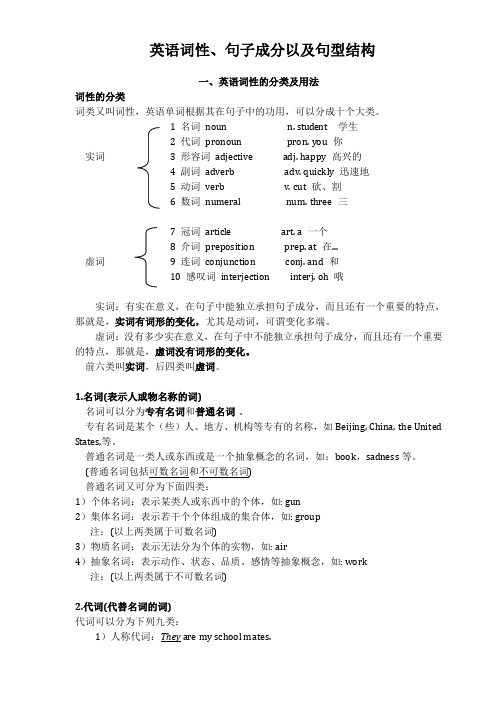
英语词性、句子成分以及句型结构一、英语词性的分类及用法词性的分类词类又叫词性,英语单词根据其在句子中的功用,可以分成十个大类。
1 名词noun n. stud ent 学生2 代词pronoun pron. you 你实词 3 形容词adjective adj. happy 高兴的4 副词adverb adv. quickly 迅速地5 动词verb v. cut 砍、割6 数词numeral num. three 三7 冠词article art. a 一个8 介词preposition prep. at 在...虚词9 连词conjunction conj. and 和10 感叹词interjection interj. oh 哦实词:有实在意义,在句子中能独立承担句子成分,而且还有一个重要的特点,那就是,实词有词形的变化,尤其是动词,可谓变化多端。
虚词:没有多少实在意义,在句子中不能独立承担句子成分,而且还有一个重要的特点,那就是,虚词没有词形的变化。
前六类叫实词,后四类叫虚词。
1.名词(表示人或物名称的词)名词可以分为专有名词和普通名词.专有名词是某个(些)人、地方、机构等专有的名称,如Beijing, China, the United States,等。
普通名词是一类人或东西或是一个抽象概念的名词,如:book,sadness等。
(普通名词包括可数名词和不可数名词)普通名词又可分为下面四类:1)个体名词:表示某类人或东西中的个体,如: gun2)集体名词:表示若干个个体组成的集合体,如: group注:(以上两类属于可数名词)3)物质名词:表示无法分为个体的实物,如: air4)抽象名词:表示动作、状态、品质、感情等抽象概念,如: work 注:(以上两类属于不可数名词)2.代词(代替名词的词)代词可以分为下列九类:1)人称代词:They are my school mates.2)物主代词:Our friends have great concern for each other.3)反身代词:Take good care of yourselves.4)相互代词:We shoul d help each other.5)指示代词:Who are these peopl e?6)疑问代词:What are you d oing?7)关系代词:She married Li Lei, who is a stud ent too.8)连接代词:Do you know who did it?9)不定代词:Do you know anything about it?代词是非常活跃的词,特别是不定代词,比较复杂,我们要熟练掌握。
九年级英语上册知识点总结

九年级英语上册知识点总结英语是一门重要的学科,九年级是学习英语的关键时期。
为了帮助同学们更好地掌握九年级英语上册的知识点,本文将对该学期所学内容进行总结。
一、语法知识点1. 时态九年级英语上册中,时态是重要的语法知识点之一。
包括一般现在时、一般过去时、一般将来时、现在进行时等。
时态的正确使用能够让我们更准确地表达过去、现在和未来的事情。
2. 从句从句是句子的一部分,功能类似于名词、形容词或副词。
在九年级英语上册中,我们学习了名词性从句、定语从句和状语从句。
通过学习从句,可以让我们的句子结构更加复杂,含义更加丰富。
3. 词形变化在九年级英语上册中,我们学习了许多词的形态变化。
包括名词的单复数形式、动词的人称和时态变化、形容词和副词的比较级和最高级等。
正确地使用词的形态变化,可以使我们的语言更加准确地表达出我们的意思。
二、阅读理解九年级英语上册的阅读理解涵盖了多种题型,如选择题、填空题、读写任务等。
通过阅读各种不同类型的文章,我们可以提高阅读理解能力,扩大词汇量,并提高自己的写作水平。
三、单词与短语九年级英语上册中我们学习了大量的单词和短语。
这些单词和短语涉及各个方面,包括描述人物、家庭、学校、城市、旅行、环境等等。
通过学习这些词汇,我们可以更好地进行交流,并更好地理解和使用英语。
四、口语交际九年级英语上册中,我们进行了很多口语交际的练习,如对话、听力理解和口头表达等。
这些练习可以增强我们的口语能力,提高我们的听力理解能力,培养我们的语感和语言表达能力。
五、写作能力九年级英语上册的写作训练主要包括句子写作和段落写作。
在句子写作中,我们学习了如何使用各种句式,使句子更加地丰富多样;在段落写作中,我们学习了如何把几个句子组成一个连贯的段落,使文章更加具有逻辑性和条理性。
六、文化知识九年级英语上册还涉及到了一些英语国家的文化知识。
通过学习英语国家的习俗、风景、历史等,我们可以更好地了解英语国家的文化背景,增加我们的跨文化交流能力。
英语词性转换归纳

英语词性转换归纳在英语学习中,词性转换是一个非常重要的知识点。
它不仅能够帮助我们更准确地理解单词的含义,还能让我们在写作和表达中更加灵活地运用词汇。
下面就来对英语中的词性转换进行一个归纳总结。
一、名词转换为动词很多名词都可以通过添加特定的后缀或改变词形来转换为动词。
例如,“hand”作为名词是“手”的意思,而“hand in”则是动词短语,表示“上交”。
“face”作为名词是“脸”,“face the problem”就是“面对问题”,此时“face”用作动词。
还有一些名词通过词形变化转换为动词,比如“water”,作名词是“水”,作动词表示“浇水”;“rain”,名词是“雨”,动词则是“下雨”。
二、动词转换为名词动词转换为名词的方式也多种多样。
常见的是在动词后加上“ion”“ment”“ance”“ence”等后缀。
例如,“decide”(决定)变成“decision”(决定);“develop”(发展)变成“development”(发展);“appear”(出现)变成“appearance”(出现;外表);“refer”(参考;提及)变成“reference”(参考;提及;参考书目)。
有的动词通过词形变化成为名词,比如“fly”(飞)变成“flight”(飞行;航班);“choose”(选择)变成“choice”(选择)。
三、形容词转换为动词形容词转换为动词相对较少,但也有一些常见的例子。
比如,“empty”,作形容词是“空的”,用作动词表示“使……空”。
“slow”作形容词是“慢的”,“slow down”则是“(使)减速”。
四、形容词转换为名词形容词转换为名词的情况比较常见。
可以在形容词后加上“ness”“ity”“th”等后缀。
例如,“happy”(快乐的)变成“happiness”(快乐);“able”(能够的)变成“ability”(能力);“wide”(宽的)变成“width”(宽度);“long”(长的)变成“length”(长度)。
Unit5-6单元单词词形变化形式2023-2024学年人教版英语九年级全册
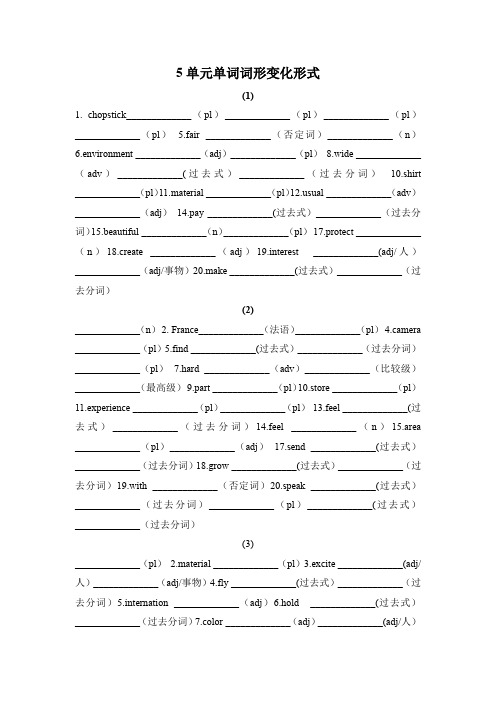
5单元单词词形变化形式(1)1.chopstick_____________(pl)_____________(pl)_____________(pl)_____________(pl) 5.fair _____________(否定词)_____________(n)6.environment _____________(adj)_____________(pl)8.wide _____________(adv)_____________(过去式)_____________(过去分词)10.shirt _____________(pl)11.material _____________(pl)1ual _____________(adv)_____________(adj)14.pay _____________(过去式)_____________(过去分词)15.beautiful _____________(n)_____________(pl)17.protect _____________(n)18.create _____________(adj)19.interest _____________(adj/人)_____________(adj/事物)20.make _____________(过去式)_____________(过去分词)(2)_____________(n)2. France_____________(法语)_____________(pl)4.camera _____________(pl)5.find _____________(过去式)_____________(过去分词)_____________(pl)7.hard _____________(adv)_____________(比较级)_____________(最高级)9.part _____________(pl)10.store _____________(pl)11.experience _____________(pl)_____________(pl)13.feel _____________(过去式)_____________(过去分词)14.feel _____________(n)15.area _____________(pl)_____________(adj)17.send _____________(过去式)_____________(过去分词)18.grow _____________(过去式)_____________(过去分词)19.with _____________(否定词)20.speak _____________(过去式)_____________(过去分词)_____________(pl)_____________(过去式)_____________(过去分词)(3)_____________(pl)2.material _____________(pl)3.excite _____________(adj/人)_____________(adj/事物)4.fly _____________(过去式)_____________(过去分词)5.internation _____________(adj)6.hold _____________(过去式)_____________(过去分词)7.color _____________(adj)_____________(adj/人)_____________(adj/事物)9.enjoy _____________(adj)10.simple _____________(adv)11.high _____________(比较级)_____________(最高级)(4)1.boss _____________(pl)_____________(pl)_____________(德国)3.postman _____________(pl)4 pete _____________(adj/人)_____________(adj/事物)5.it _____________(名词所有格)_____________(n)7.balloon _____________(pl)_____________(adj活着的)_____________(adj生动可爱的)_____________(adj)10 plete _____________(adv)11.tradition _____________(adj)12.art _____________(n)13.beautiful _____________(n)14.important _____________(比较级)_____________(最高级)_____________(比较级)_____________(最高级)16.object _____________(pl)17.one _____________(序数词)18.send _____________(过去式)_____________(过去分词)_____________(pl)20.light _____________(过去式)_____________(过去分词)21.see _____________(过去式)_____________(过去分词)_____________(pl)_____________(adv)_____________(n)24.wish _____________(pl)_____________(比较级)_____________(最高级)26.cut _____________(过去式)_____________(过去分词)27.piece _____________(pl)28.child _____________(pl)29. live_____________(adj活着的)_____________(adj生动可爱的)30.special _____________(adv)31. step_____________(pl)_____________(过去式)_____________(过去分词)33.spend _____________(过去式)_____________(过去分词)34.express _____________(n)_____________(过去式)_____________(过去分词)36.invite _____________(n)_____________(adv)38.know _____________(过去式)_____________(过去分词)6单元单词词形变化形式(1)1.heel __________________________(adj) 3.project __________________________(adj)_____________(n)_____________(adj)6.life _____________(pl)7.invent _____________(adj/人)_____________(adj/事物)_____________(adj)_____________ _____________(pl)11.hit _____________(过去式)_____________(过去分词)12.serve _____________(现在分词)13.low _____________(比较级)_____________(最高级)_____________(现在分词)15.role __________________________(过去式)_____________(过去分词)17.pioneer _____________(pl)18.wide _____________(adv)19.popular _____________(n)20.dress _____________(pl)(2)1.it_____________(名词所有格)2.accident _____________(adj)_____________(序数词)4.rule _____________(pl)_____________(pl)6.plant _____________(pl)7.fine _____________(比较级)_____________(最高级)8.bring _____________(过去式)_____________(过去分词)_____________(pl)10.little _____________(比较级)_____________(最高级)11.nation _____________(adj)12.west _____________(adj)_____________(过去式)_____________(过去分词)_____________(过去式)_____________(过去分词)15.popular _____________(n)16.with _____________(否定词)17.nature _____________(adj)18.drink _____________(过去式)_____________(过去分词)19.drop _____________(过去式)_____________(过去分词)20.country _____________(pl)21.sell _____________(过去式)_____________(过去分词)22.steal _____________(过去式)_____________(过去分词)_____________(n)24.photo _____________(pl)_____________(n)_____________(adv)27.break _____________(过去式)_____________(过去分词)28.final _____________(adv)29.music _____________(adj)_____________(adj)(3)1.salt _____________(adj)2.mistake_____________(pl)3.chip _____________(pl)4.history _____________(adj)5.potato _____________(pl)6.real _____________(adv)7.accident _____________(adj)_____________(adv)_____________(过去式)_____________(过去分词)_____________(adv)11.story _____________(pl)(4)1.quick _____________(adv)2.active_____________(n)3.event _____________(pl)4.Canada _____________(adj)5.create ____________(adj)6.teach _____________(过去式)_____________(过去分词)7 pete _____________(adj/人)_____________(adj/事物)____________(形容词性物主代词)____________(名词性物主代词)_____________(反身代词)9.popular _____________(n)10.rise _____________(过去式)_____________(过去分词)_____________(n)12.factory _____________(pl)13.foreign _____________(n)14.include _____________(prep)_____________(pl)_____________(v)17.achieve _____________(n)_____________(n)19.three _____________(序数词)_____________(n)____________(adj)22.special _____________(adv)_____________(n)24.he _____________(反身代词)25.person ____________(adj)26.purpose _____________(pl)。
中考英语词性转换解题技巧及易错点讲解
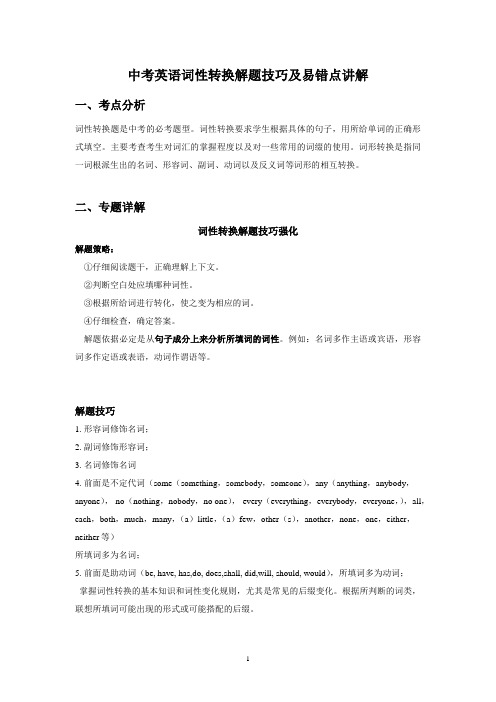
中考英语词性转换解题技巧及易错点讲解一、考点分析词性转换题是中考的必考题型。
词性转换要求学生根据具体的句子,用所给单词的正确形式填空。
主要考查考生对词汇的掌握程度以及对一些常用的词缀的使用。
词形转换是指同一词根派生出的名词、形容词、副词、动词以及反义词等词形的相互转换。
二、专题详解词性转换解题技巧强化解题策略:①仔细阅读题干,正确理解上下文。
②判断空白处应填哪种词性。
③根据所给词进行转化,使之变为相应的词。
④仔细检查,确定答案。
解题依据必定是从句子成分上来分析所填词的词性。
例如:名词多作主语或宾语,形容词多作定语或表语,动词作谓语等。
解题技巧1. 形容词修饰名词;2. 副词修饰形容词;3. 名词修饰名词4. 前面是不定代词(some(something,somebody,someone),any(anything,anybody,anyone), no(nothing,nobody,no one), every(everything,everybody,everyone,),all,each,both,much,many,(a)little,(a)few,other(s),another,none,one,either,neither等)所填词多为名词;5. 前面是助动词(be, have, has,do, does,shall, did,will, should, would),所填词多为动词;掌握词性转换的基本知识和词性变化规则,尤其是常见的后缀变化。
根据所判断的词类,联想所填词可能出现的形式或可能搭配的后缀。
词性转换分类汇总I.形容词——副词1、加lyquiet安静的 quick 快速的 slow慢的 beautiful美丽的 bright明亮的 careful仔细的 certain一定clear清楚 loud大声 sad难过的 wide广泛 serious严重的 usual通常 final最后 safe安全real真的 recent最近的 main主要的 accurate精确的2、去y加ilyeasy容易的 heavy大量angry生气的 hungry饥饿的happy 快乐的 lucky幸运的3、le结尾的,去e变ypossible可能 gentle轻柔的4、不变hard难的;努力地,猛烈地 fast 快early早 late 晚enough足够 straight笔直II. 动词——名词1、加er、or、ress加erfarm 耕种—农民 drive 驾驶—驾驶员司机teach 教—老师 work 工作—工人 write 写—作家 report 报道—记者 win 赢(winner)—获胜者 own 拥有—owner拥有者 paint画、粉刷---画家 manage 经营—经理 record 记录—录音机加oract--actor 男演员 visit—visitor观光者 invent--inventor 发明家 calculate—calculator计算器加resswait—waitress女服务员 act—actress女演员2、加ion结尾add—add i tion 增加 collect—collection 收集 discuss—discussion讨论 decide—decision决定 invent—invention发明物 invite—invitation 邀请 operate—operation手术 pollute—pollution 污染review—revision 复习 solve—solution解答 organize—organization组织 locate—location地点suggest—suggestion建议 protect---prote ction 保护3、加ingbegin—begi nn ing开始 build—building大楼 say—saying 谚语 paint—painting 绘画meet—meeting 会议4、其他serve—service 服务 speak—speech 演讲、言语 fish—fisherman 渔夫 enter—entrance 入口know—knowledge 知识 weigh—weight 重量 please—pleasure 愉快 develop—development 发展choose—choice选择 tour—tourist 游客die—death 死亡 succeed—success 成功fly—flight 飞行、航班 memorize—memory 记忆mix—mixture 混合物 cook—cook 厨师save—safety 安全 act—activity 活动 able—ability 能力III. 名词——名词art艺术—artist画家 science—scientist 科学家city—citizen市民 custom—customer 顾客office—officer 官员 engine—engineer工程师 friend—friendship 友谊business—businessman男商人 business—businesswoman女商人library—librarian 图书管理员 law法律—lawyer律师IV. 名词——形容词1、名词后加fulcare—careful 小心的 use—useful 有用的 help—helpful有帮助的 thank—thankful 感激的wonder—wonderful精彩的 power—powerful 强大的 harm—harmful 有害的2、名词后加ycloud—cloudy 多云的 rain—rainy 下雨的 wind—windy 有风的 snow—snowy 下雪的sun—su nn y 晴朗的 noise—noisy 吵闹的 health—healthy 健康的 fun—funny 滑稽的luck—lucky 幸运的3、名词后加lyfriend—friendly 友好的 love—lovely 可爱的 live—lively 活泼的4、形容词以al 结尾nation—national 国家的 education--educational 教育的 nature—natural 自然的tradition—traditional 传统的 medicine—medical 医药的 physics—physical 物理的chemistry—chemical 化学的 history—historical 历史的5、名词末尾的ce变成tdifference(s)—different 不同 importance—important 重要的6、名词后加enwood—wooden木制的 gold—golden金色的 (wool—woolen 羊毛的)7、名词以ness结尾kindness仁慈—kind仁慈的 illness病疾病--- ill有病的不健康的8、形容词后加ydifficult—difficulty 困难 honest—honesty诚实9、形容词后加domfree—freedom 自由 wise—wisdom 聪明10、其他danger—dangerous 危险的office—official 官方的、正式的fool傻瓜—foolish 愚蠢的west—western 西方的height高度— high高的 length长度—long 长的favour恩惠—favourite 最喜欢的foreigner外国人—foreign 外国的home家—homeless 无家可归的expense费用—expensive 昂贵的 truth真相—true 真实的wound创伤—wounded 受伤的pleasure—pleasant 另人愉快的/ pleased 满意的response相应反映--- responsible 负责的有责任的electricity电—electric电的—electrical 与电有关的—electronic 电子的V. 动词——形容词interest引起兴趣—interesting 有趣的/ interested 感兴趣的excite—exciting 令人激动的/ excited激动的 freeze—freezing 寒冷的/ frozen 冷冻的frighten—frightening 令人害怕的/ frightened害怕的forget—forgetful健忘的 / unforgettable 难忘的 depend—independent 独立的有主见的like—likely很有可能发生的有希望的 realize意识到—real 真的break—broken 碎的 follow—following 下面的 fill—full 满的、饱的enjoy—enjoyable使人愉快的 change—changeable 多变的 act—active 积极的attract—attractive 吸引人的 die—dead 死的 widen拓宽—wide 宽的 live—alive活的VI. 前缀possible—impossible (polite, patient)可能—不可能 tell—retell说—复述build—rebuild 建造—重建healthy—unhealthy健康的—不健康的honest—dishonest诚实—不诚实的appear—disappear出现—消失like—dislike 喜欢—不喜欢male—female 男性—女性VII. 国名——国籍Australia—Australian America—American Canada—Canadian Britain—British England—English Italy—ItalianFrance— French Germany—German (德国人复数German s)强化练习从句子成分角度完成下列习题:1. Thanksgiving is a ______ festival in the USA and Canada. (tradition)2. There were only a few _____ from the air-crash. (survive)3. After careful ____, the committee decided to recommend Mr. Smith for the post. (consider)4. Do you agree that it is important to make yourself _____? (understand)5. I’ve lived in Chongqing for several years and I’m now used to _______hot food. (eat)6. He has to check the _____ of a difficult word before he uses it. (spell)7. The businessman lost a _______ chance to make a big fortune. (gold)9. In some parts of this city, missing a bus means ______ for another hour. (wait)10. Her early ______ gave everyone a big surprise. (arrive)11. The little girl gave an ______ wonderful performance last night. (extreme)12. The more challenging the journey is, the ______ the young people will feel. (happy)13. There has not been a favorable ______ to your plan so far. (respond)14. After they got on the bus, they found two _______. (sit)15. What we have had is just part of the truth. We should try to get ___________ information about it. (far)16. Now more and more gardens are being built in our __________. (neighbour)17. _________ speaking, the computer has become an important part of our life. (general)18. It will ______ rain this afternoon, for the sky is so dark now. (impossible)19. Many people in China are not familiar with ________ customs. (west)20.The room is so dirty that a lot of __________ can be seen running here and there. (mouse)21. It's rude to look ________ at a person. (straight)22. There is no short-cut to _________. ( succeed )23. The reporter went to the sea with several _________ to look for the lost boat. (fish)24. There are many places of ________ interest in Shanghai. (history)25. Mr. Marko is one of the __________ of that factory. (engine)26. It’s ten _________ walk from here. You needn’t take a bus. (minute)27. Jacky told us an ________ story that everybody laughed happily. (amusement)28. Thanks for _______ me. I’ll do my best. (choice)29. It’s much ___________ to swim with your friend than to swim alone. (safe)30. It was snowing _________ outside. (hard)31. How many ___________ lessons do you have every week? (physical)32. They were well ____________ at a friend’s house. (service)33. The sun gives us light and ________. (hot)34. We saw her running _________ the street just now. (cross)35. I’ll do my homework more __________ next time. (care)36. In _________ to hard work, we need some good ways to succeed. (add)37. In the past punishment(惩罚)was decided by the university. The student had no ___________ but to accept it. (choose)38. A ___________ sight stopped them from going forward. (frighten)39. The visitors are ________ students. (main)40. Of all the boys, Li Ming studies ______. (hard)41. These modern machines work ____. (automatic)42. Actions speak _____ than words. (loud)43. I _________ where he comes from. (wonderful)44. We tried all sorts of __________, but they were all useless. (medical)45. Carl looks much ________ than before. (health)46. The little boy can run a marathon in __________ than three hours. (little)47. The lost calculator has been returned to its __________. (own)48. Even __________, he lost his job. (bad)49. Life today is becoming harder and busier, so everyone should have his own way of __________. (relax)50. I am fond of _________ fiction. (scientist)51. Could you tell me whether it is a ________ change or a physical change? ( chemistry )52. The students are not allowed to touch the ________ without permission. ( chemistry )53. Do you know who the telephone was________ by? (invention)54. We went to a beautiful lake and spent an _______________ day. (forget)55. What _____________ weather we are having now! (freeze)56. He tried to make more money to work out a solution to travelling _____________ (expensive)57. She _______ her face with her hands. (discover)58. Our house____________ an area of 200 square metres. (discover)59. The great_______ always teaches me how to _______ the ________ (paint)60. He is one of the most famous _________ in the university. (professional)答案:1-5 traditional;survivors;consideration;understood;eating6-10 spelling;golden;experienced;waiting;arrival;11-15 extremely;happier;response;seats;further16-20 neighborhood;Generally;possibly;western;mice21-25 straight;success;fishermen;historical;engineers;26-30 minutes';amusing;choosing;safer;hard31-35 physics;served;heat;across;carefully36-40 addition;choice;frightening;mainly;hardest41-45 automatically;louder;wonder;medicine;healthier46-50 less;owner;worse;relaxation;science51-55 chemical;invented;unforgettable;freezing55-60 expense;covered;covers;painter- paint-painting ;professor。
九年级英语词性转换知识点

九年级英语词性转换知识点词性转换是学习英语词汇的重要一环,它可以帮助我们更好地理解单词在句子中的用法和语言表达的意义。
在九年级英语学习中,词性转换知识点需要我们掌握和灵活运用的,下面将从名词、动词、形容词和副词四个方面,介绍九年级英语词性转换的知识点。
一、名词的转换名词是指表示人、事物、地点等概念的词语,它可以通过加前缀、后缀或者变化词形来转换词性。
1. 从名词转换为形容词:在名词后面加上形容词后缀,如-ful、-able等。
例如:名词:care(关怀)形容词:careful(关心的)2. 从名词转换为动词:在名词前面或后面加上动词前缀或后缀,如un-、dis-、-en等。
例如:名词:agree(同意)动词:disagree(不同意)3. 从名词转换为副词:在名词后面加上副词后缀-ly。
例如:名词:quick(快)副词:quickly(快速地)二、动词的转换动词是表示动作、状态或者存在的词语,它可以通过加前缀、后缀或者变化词形来转换词性。
1. 从动词转换为名词:在动词前面加上名词前缀或者后缀,如re-、-ion等。
例如:动词:help(帮助)名词:helper(帮助者)2. 从动词转换为形容词:在动词后面加上形容词后缀-able、-ing等。
例如:动词:interest(使感兴趣)形容词:interesting(有趣的)3. 从动词转换为副词:在动词后面加上副词后缀-ly。
例如:动词:quick(快)副词:quickly(快速地)三、形容词的转换形容词是用来描述名词的性质、特征和状态的词语,它可以通过加前缀、后缀或者变化词形来转换词性。
1. 从形容词转换为名词:在形容词前面加上名词前缀-ness、-ity等。
例如:形容词:happy(快乐的)名词:happiness(快乐)2. 从形容词转换为动词:在形容词前面加上动词前缀-ize、-en 等。
例如:形容词:modern(现代的)动词:modernize(使现代化)3. 从形容词转换为副词:在形容词后面加上副词后缀-ly。
最新英语单词词性转换的基本规律

英语单词词性转换的基本规律一词性变换的一般的规律1.动词(v.)→名词(n.)(a)词形不变,词性改变work, study, water, plant等可以用作动词(工作,学习,浇水,种植),也可以用作名词(工作,学习,水,植物).(b)一些动词在词尾加上-er或-or之后就变成了表示"某一类人"的名词例如:work—worker, teach—teacher, sing—singer, jump—jumper, play—player, learn—learner, visit—visitor, invent—inventor,collect—collector等.注意:1)以不发音的e结尾的动词,在词尾加-r.例如:drive—driver, write—writer等.2)以重读闭音节结尾,且末尾只有一个辅音字母的动词,应双写末尾的辅音字母,再加-er例如:run—runner, win—winner,begin—beginner等.(c)在动词词尾加上-ment 变成名词例如:achieve—achievement (成就) advertise—advertisement(广告) agree—agreement disagree—disagreementamuse—amusement (娱乐) improve—improvement(争吵)commit(奉献)—commitment develop—development (发展)depart—department (局,部) govern(统治)—government(政府)manage—management (管理) equip—equipment (装备)有些单词比较特殊,需把动词后的e去掉再加ment.例如:argue—argument(争论)(d)在动词词尾加上-(t)ion/(s)ion变成名词例如: attract—attraction; instruct—instruction;invent—invention discuss—discussion;express—expression educate—education;graduate—graduation; operate—operation (去e再加"ion")compete—competition; organize—organization (把e改成其他字母再加"tion") decide—decision conclude—conclusion (把de改为s再加"ion")describe—description描写,描绘(这是特例,不规则变化)(e)在动词词尾加上-ance变成名词例如: appear—appearance (外貌;出现) perform—performance (演出)accept—acceptance (接受)(f)在动词词尾加-ing变成名词(方法与动词变为现在分词的方法相同)例如: meet—meeting build—building wait—waitingbathe—bathing say—saying(谚语) mean—meaningend —ending train —training wash—washing注意:以重读闭音节结尾,且末尾只有一个辅音字母的动词,应双写末尾的辅音字母,再加-ing如:swim—swimming shop—shopping begin—beginning(g)其他一些比较特殊的变化例如: Beg(乞讨)—beggar(乞丐) behave(行为举止)—behaviorknow(知道)—knowledge(知识) fly—flight (飞行)heat (加热)—heat(热量) hit (撞击)—hit( 轰动一时的人或物,碰撞)mix (混合)—mixture(混合物) press(按,压)—pressure(压力)sit(坐)—seat (座位) succeed—success(成功)tour—tour(旅游)/ tourist (游客)2.动词(v.)→形容词(adj.)(a)动词后面加able,以e结尾的动词则去e加able,表示具有此性质,特点或属性.例如: afford-affordable;love-lovable(b)动词后面加ed,以e结尾的动词则直接加d,表示被动性的属性或特点.例如: scatter-scattered use-used(c)不规则的动词则必须记忆,记住其过去分词形式.规律不大,意义同(b).3.名词(n.)→形容词(adj.)(a)在名词后面加-y可以变成形容词(尤其是一些与天气有关的名词)例如: rain—rainy, cloud—cloudy, wind—windy, snow—snowy,health—healthy, luck—lucky,anger—angry guilt—guilty(内疚的)tourist—touristy(游客多的) , salt (盐)—salty (咸的)silk(丝绸)—silky(丝绸般的), sleep—sleepy (昏昏欲睡的)注意:1)如果以重读闭音节结尾,且词尾只有一个辅音字母,这时应双写辅音字母再加"-y". 如: sun —sunny, fun—funny, fog—foggy(有雾的), fur—furry(毛皮的)2)少数以不发音的e结尾的名词变为形容词时,应去掉e再加"-y".如: noise—noisy, ice—icy, shine—shiny(发亮的), taste(口味)—tasty(甜的)(b)名词后面加-ed,以e结尾的直接加d.例如: spot(斑点)—spotted(有斑点的); talent—talented (有天赋的)organize—organized 有组织的; balance—balanced(平衡的)(c)一些抽象名词在词尾加-ful可以变为形容词例如:care—careful, thank—thankful, help—helpful,use—useful, meaning—meaningful(d)在名词后加-less构成含有否定意义的形容词例如:care—careless(粗心的), use—useless(无用的)hope—hopeless(没希望的),home—homeless(无家可归的)(e)一些以-ce结尾的名词,把-ce改为-t变成形容词例如: difference—different, silence—silent, confidence—confident(f).在名词后加-ly变为形容词例如: friend—friendly, love—lovely, live---lively(g).在名词后加-ous变为形容词例如: danger—dangerous(h)名词后面加-al变为形容词例如: music—musical; medicine—medical (这个比较特殊)(i)名词后面加-able变为形容词,如果以e结尾就去e再加"-able".例如: adjust—adjustable 可调整的value—valuable有价值的(j)名词后面加-en变成形容词例如: wood—wooden 木制的wool—woolen 羊毛的(k)一些表示国家的名词可以在词尾加-ese, -ish或-n构成表示国籍,语言的形容词例如:China—Chinese, Japan—Japanese, England—English,America—American, India—Indian, Australia —Australian (注意Canada—Canadian)4.形容词(adj.)→副词(adv.)▲一般在形容词的词尾加-ly可以变成副词例如: quick—quickly, slow—slowly, loud—loudly, sudden—suddenly 等但是,以下几点值得注意:(a) 一些以"辅音字母+y"结尾的形容词,要把y改为i再加-ly例如: happy—happily, angry—angrily, lucky—luckily, heavy—heavily, noisy—noisily(b) 有些以-ble或-le结尾的形容词,去掉e加-y例如:possible—possibly, terrible—terribly(c)少数以e结尾的形容词,要去掉e再加-ly例如: true—truly但绝大多数以e结尾的形容词仍然直接加-ly 例如: polite—politely, wide—widely(d)以-l结尾的形容词变为副词时要在词尾加-ly,以-ll结尾的才在词尾只加-y.例如: usual—usually, careful—carefully, useful—usefullyfull—fully (以-ll结尾的才只加y)二. 派生:指由一个词根加上前缀和(或)后缀构成另一个词的构词形式。
九年级英语词性词形变化

九年级英语词性/词形变化Unit 1n. help v. helpful adj.speakingspoken speakerreaderquickly<mainlymeaningprobablydifficultycallednamedfunnyexpression~discoverinteresting interestedboring boredrelaxing relaxedreallymore most19. loud loudly aloudunderstanding(usefulraise risecreativewellactivitysuccessfulsuccessfully succeedovernight~timeswiselywriterlearn learnerread readerdisagreeworrieddevelopment【developing developedeasilylonglifesuggestioninformation news%importanceUnit 2wonderfulweatherstrangertruly truthlucky luckily*miss Miss.traditionaltouchinggoddesscelebrationmedicalthankfullaid laid(lay lainbusinessdead deathcareful carefullycareless carelesslyvisitorscaredhappiness)decisionwarmthbeginningpopularity26. difference different differentlymagicianspeciallycultural】foreignerUnit 3besidesleftrightridenormally'scaredsuggestionlater latest latelynearbyeasternsouthernhungerinexpensive(uncrowdedsafetypolitely17. impolite impolitelydirector19. direct direction directlycorrectlyspeaker·speaking spokenwhomincludingleadercommunicationposterpleased pleasantpossibly。
英语单词词性转换方法法
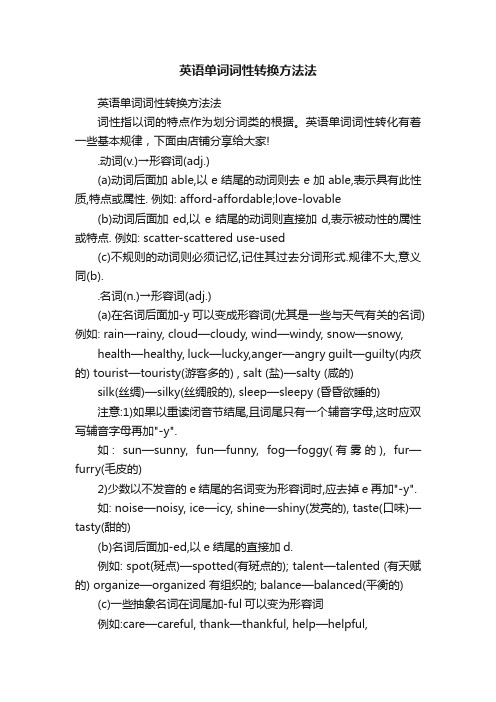
英语单词词性转换方法法英语单词词性转换方法法词性指以词的特点作为划分词类的根据。
英语单词词性转化有着一些基本规律,下面由店铺分享给大家!.动词(v.)→形容词(adj.)(a)动词后面加able,以e结尾的动词则去e加able,表示具有此性质,特点或属性. 例如: afford-affordable;love-lovable(b)动词后面加ed,以e结尾的动词则直接加d,表示被动性的属性或特点. 例如: scatter-scattered use-used(c)不规则的动词则必须记忆,记住其过去分词形式.规律不大,意义同(b)..名词(n.)→形容词(adj.)(a)在名词后面加-y可以变成形容词(尤其是一些与天气有关的名词) 例如: rain—rainy, cloud—cloudy, wind—windy, snow—snowy, health—healthy, luck—lucky,anger—angry guilt—guilty(内疚的) tourist—touristy(游客多的) , salt (盐)—salty (咸的)silk(丝绸)—silky(丝绸般的), sleep—sleepy (昏昏欲睡的)注意:1)如果以重读闭音节结尾,且词尾只有一个辅音字母,这时应双写辅音字母再加"-y".如: sun—sunny, fun—funny, fog—foggy(有雾的), fur—furry(毛皮的)2)少数以不发音的e结尾的名词变为形容词时,应去掉e再加"-y".如: noise—noisy, ice—icy, shine—shiny(发亮的), taste(口味)—tasty(甜的)(b)名词后面加-ed,以e结尾的直接加d.例如: spot(斑点)—spotted(有斑点的); talent—talented (有天赋的) organize—organized 有组织的; balance—balanced(平衡的)(c)一些抽象名词在词尾加-ful可以变为形容词例如:care—careful, thank—thankful, help—helpful,use—useful, meaning—meaningful(d)在名词后加-less构成含有否定意义的形容词例如:care—careless(粗心的), use—useless(无用的)hope—hopeless(没希望的),home—homeless(无家可归的)(e)一些以-ce结尾的名词,把-ce改为-t变成形容词例如: difference—different, silence—silent, confidence—confident(f).在名词后加-ly变为形容词例如: friend—friendly, love—lovely, live---lively(g).在名词后加-ous变为形容词例如: danger—dangerous(h)名词后面加-al变为形容词例如: music—musical; medicine—medical (这个比较特殊)(i)名词后面加-able变为形容词,如果以e结尾就去e再加"-able". 例如: adjust—adjustable 可调整的. value—valuable有价值的(j)名词后面加-en变成形容词例如: wood—wooden 木制的 wool—woolen 羊毛的.动词(v.)→名词(n.)(a)词形不变,词性改变例如:work, study, water, plant等可以用作动词(工作,学习,浇水,种植),也可以用作名词(工作,学习,水,植物).(b)一些动词在词尾加上-er或-or之后就变成了表示"某一类人"的名词例如:work—worker, teach—teacher, sing—singer,jump—jumper, play—player, learn—learner,visit—visitor, invent—inventor,collect—collector等.注意:1)以不发音的e结尾的动词,在词尾加-r.例如:drive—driver, write—writer等.2)以重读闭音节结尾,且末尾只有一个辅音字母的动词,应双写末尾的辅音字母,再加-er例如:run—runner, win—winner,begin—beginner等.(c)在动词词尾加上-ment 变成名词例如:achieve—achievement (成就)advertise—advertisement//advertising(广告)agree—agreement disgree—disagreementamuse—amusement (娱乐) improve—improvement(争吵)commit(奉献)—commitment develop—development (发展) depart—department (局,部) govern(统治)—government(政府) manage—management (管理) equip—equipment (装备)有些单词比较特殊,需把动词后的e去掉再加ment.例如:argue—argument(争论)(d)在动词词尾加上-(t)ion/(s)ion变成名词例如: attract—attraction; instruct—instruction;invent—invention discuss—discussion;express—expression educate—education;graduate—graduation; operate—operation (去e再加"ion") compete—competition; organize—organization (把e改成其他字母再加"tion") decide—decision conclude—conclusion (把de 改为s再加"ion")describe—description描写,描绘 (这是特例,不规则变化)(e)在动词词尾加上-ance变成名词例如: appear—appearance (外貌;出现)perform—performance (演出)accept—acceptance (接受)(f)在动词词尾加-ing变成名词 (方法与动词变为现在分词的方法相同)例如:meet—meeting build—building wait—waiting bathe—bathing say—saying(谚语) mean—meaningend —ending train —training wash—washing 注意:以重读闭音节结尾,且末尾只有一个辅音字母的动词,应双写末尾的辅音字母,再加-ing如:swim—swimming shop—shopping begin—beginning(g)其他一些比较特殊的变化例如: Beg(乞讨)—beggar(乞丐) behave(行为举止)—behavior know(知道)—knowledge(知识) fly—flight (飞行)heat (加热)—heat(热量) hit (撞击)—hit( 轰动一时的人或物,碰撞) mix (混合)—mixture(混合物) press(按,压)—pressure(压力) sit(坐)—seat (座位) succeed—success(成功)tour—tour(旅游)/ tourist (游客)形容词→副词一般在形容词的词尾加-ly可以变成副词。
初中英语词汇的三变:变性、变形、变态

英语词汇的三变:变性、变形、变态在英语学习过程中,不少初学英语的人都会发现,英语的词形变化是比较复杂的,所以觉得很难把握。
但事实上,只要你把握了其变化的原则或规律,就不会那么难记了。
一般来说,可以词形变化可以归纳为三大类,那就是“三变”:一是“变性”,二是“变形”,三是“变态”。
1,“变性”:就是改变词性。
在一个英语句子中,一个词由于所处的位置不同,在句子所充当的角色(作用)就不同,所以要以适当的词性表现自己(如:动词变成名词、形容词变成副词等),这就叫做词位定词性。
2.“变形”:就是改变词形(谓语与非谓语、名词单数变复数、代词的单数与复数、主格与宾格、形容词的原级变比较级或最高级等)。
1)一个动词在具体的语境中,往往要按照语境的需要在词形上发生适当的变化。
语境就好比一个“舞台”,不同的动词就像不同的“演员”。
每个演员走进舞台后就要要根据剧情的需要以不同角色和形式(穿上不同的“服装”)来表现自己。
其中谓语动词是主角,非谓语动词是配角。
2) 形容词、名词、代词等在具体的语境中也要根据需要适当变形。
3.“变态”:就是改变形态(时态、语态)。
在一个英语句子中,必须要有谓语动词,而每个谓语动词的表达又要受到时间的限制。
所以在不同的时间背景下,要用不同的形态来表现自己。
这就好比一个演员上台表演一样,在不同的时间段、不同的年龄段或不同的动作就要穿上不同的服装或不同的面孔来展现自己。
附:例句:1. It's of great_____(important) to learn English well.(变性:形容词变名词important--importance) 2. 1)Yesterday he wrote (write) me a letter telling(tell) me he would come(come) to see(see) me soon.(变形:谓语与非谓语) 2)He is one of the tallest boys in our class.(形容词和名词的变形)3. Finally the thief was caught(catch) by the police.(变态:时态与语态)。
英语单词词性转换的基本规律
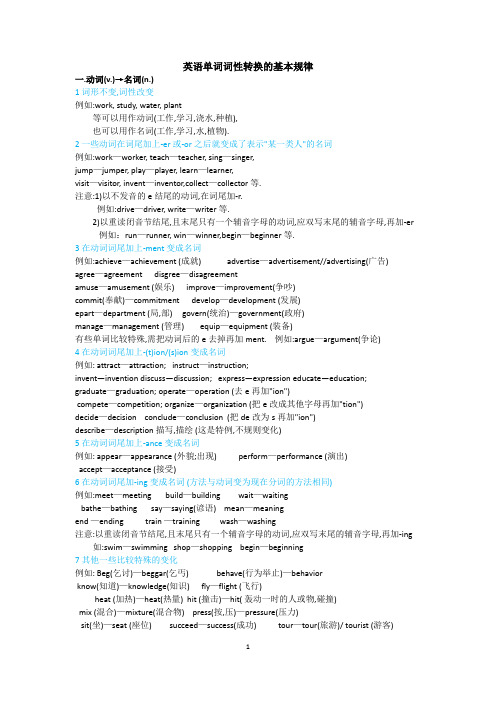
英语单词词性转换的基本规律一.动词(v.)→名词(n.)1词形不变,词性改变例如:work, study, water, plant等可以用作动词(工作,学习,浇水,种植),也可以用作名词(工作,学习,水,植物).2一些动词在词尾加上-er或-or之后就变成了表示"某一类人"的名词例如:work—worker, teach—teacher, sing—singer,jump—jumper, play—player, learn—learner,visit—visitor, invent—inventor,collect—collector等.注意:1)以不发音的e结尾的动词,在词尾加-r.例如:drive—driver, write—writer等.2)以重读闭音节结尾,且末尾只有一个辅音字母的动词,应双写末尾的辅音字母,再加-er例如:run—runner, win—winner,begin—beginner等.3在动词词尾加上-ment 变成名词例如:achieve—achievement (成就) advertise—advertisement//advertising(广告) agree—agreement disgree—disagreementamuse—amusement (娱乐) improve—improvement(争吵)commit(奉献)—commitment develop—development (发展)epart—department (局,部) govern(统治)—government(政府) manage—management (管理) equip—equipment (装备)有些单词比较特殊,需把动词后的e去掉再加ment. 例如:argue—argument(争论)4在动词词尾加上-(t)ion/(s)ion变成名词例如: attract—attraction; instruct—instruction;invent—invention discuss—discussion; express—expression educate—education; graduate—graduation; operate—operation (去e再加"ion")compete—competition; organize—organization (把e改成其他字母再加"tion") decide—decision conclude—conclusion (把de改为s再加"ion") describe—description描写,描绘 (这是特例,不规则变化)5在动词词尾加上-ance变成名词例如: appear—appearance (外貌;出现) perform—performance (演出)accept—acceptance (接受)6在动词词尾加-ing变成名词 (方法与动词变为现在分词的方法相同)例如:meet—meeting build—building wait—waitingbathe—bathing say—saying(谚语) mean—meaningend —ending train —training wash—washing注意:以重读闭音节结尾,且末尾只有一个辅音字母的动词,应双写末尾的辅音字母,再加-ing 如:swim—swimming shop—shopping begin—beginning7其他一些比较特殊的变化例如: Beg(乞讨)—beggar(乞丐) behave(行为举止)—behaviorknow(知道)—knowledge(知识) fly—flight (飞行)heat (加热)—heat(热量) hit (撞击)—hit( 轰动一时的人或物,碰撞)mix (混合)—mixture(混合物) press(按,压)—pressure(压力)sit(坐)—seat (座位) succeed—success(成功) tour—tour(旅游)/ tourist (游客)1动词后面加able,以e结尾的动词则去e加able,表示具有此性质,特点或属性.例如: afford-affordable;love-lovable2动词后面加ed,以e结尾的动词则直接加d,表示被动性的属性或特点.例如: scatter-scattered use-used2不规则的动词则必须记忆,记住其过去分词形式.规律不大,意义同(b).三.名词(n.)→形容词(adj.)1在名词后面加-y可以变成形容词(尤其是一些与天气有关的名词)例如: rain—rainy, cloud—cloudy, wind—windy, snow—snowy,health—healthy, luck—lucky,anger—angry guilt—guilty(内疚的)tourist—touristy(游客多的) , salt (盐)—salty (咸的)silk(丝绸)—silky(丝绸般的), sleep—sleepy (昏昏欲睡的)注意:1)如果以重读闭音节结尾,且词尾只有一个辅音字母,这时应双写辅音字母再加"-y".如: sun—sunny, fun—funny, fog—foggy(有雾的), fur—furry(毛皮的)2)少数以不发音的e结尾的名词变为形容词时,应去掉e再加"-y".如: noise—noisy, ice—icy, shine—shiny(发亮的), taste(口味)—tasty(甜的)2名词后面加-ed,以e结尾的直接加d.例如: spot(斑点)—spotted(有斑点的); talent—talented (有天赋的)organize—organized 有组织的; balance—balanced(平衡的)3一些抽象名词在词尾加-ful可以变为形容词例如:care—careful, thank1—thankful, help—helpful, use—useful, meaning—meaningful 4在名词后加-less构成含有否定意义的形容词例如:care—careless(粗心的), use—useless(无用的)hope—hopeless(没希望的),home—homeless(无家可归的)5一些以-ce结尾的名词,把-ce改为-t变成形容词例如: difference—different, silence—silent, confidence—confident6.在名词后加-ly变为形容词例如: friend—friendly, love—lovely, live---lively7.在名词后加-ous变为形容词例如: danger—dangerous8名词后面加-al变为形容词例如: music—musical; medicine—medical (这个比较特殊)9名词后面加-able变为形容词,如果以e结尾就去e再加"-able".例如: adjust—adjustable 可调整的 value—valuable有价值的10名词后面加-en变成形容词例如: wood—wooden 木制的 wool—woolen 羊毛的11一些表示国家的名词可以在词尾加-ese, -ish或-n构成表示国籍,语言的形容词例如:China—Chinese, Japan—Japanese, England—English,America—American, India—Indian, Australia —Australian(注意Canada—Canadian)▲一般在形容词的词尾加-ly可以变成副词例如: quick—quickly, slow—slowly, loud—loudly, sudden—suddenly 等但是,以下几点值得注意:1一些以"辅音字母+y"结尾的形容词,要把y改为i再加-ly例如: happy—happily, angry—angrily, lucky—luckily, heavy—heavily, noisy—noisily有些以-ble或-le结尾的形容词,去掉e加-y例如:possible—possibly, terrible—terribly3少数以e结尾的形容词,要去掉e再加-ly例如: true—truly但绝大多数以e结尾的形容词仍然直接加-ly例如: polite—politely, wide—widely4以-l结尾的形容词变为副词时要在词尾加-ly,以-ll结尾的才在词尾只加-y.例如: usual—usually, careful—carefully, useful—usefullyfull—fully (以-ll结尾的才只加y)PS:有些同学可能对元音辅音以及重读闭音节不是很了解,那我在这里再做下补充说明. 1.英语26个字母中,a e i o u是元音字母, y是半元音字母, 其余都是辅音字母.★所谓半元音就是有时候做元音,有时候做辅音.半元音字母y做元音有: shy,sky 做辅音比如最简单的:yes2.开音节和闭音节开音节分两种:绝对开音节和相对开音节绝对开音节指的是"元音字母结尾"的音节 (例如 we, hi等)相对开音节是指"辅音字母-元音字母-辅音字母-不发音的e"的音节,(r除外). ( 例如,take,make 等)比如:take (在这个单词中,t是辅音,a是元音,k是辅音,e是不发音的元音)◆在开音节中, 元音字母发他们在字母表中的音闭音节, 则是指"辅音字母-元音字母-辅音字母"的音节 ( -al等除外) (例如:leg,cross等)◆在闭音节中,元音字母发不同的音 a e i o u例 sat let sit not nut (试着读下这些单词,这些单词中,元音发的音都不是它们在字母表中发的音)2.英语重读闭音节就是以辅音因素结尾的,而且是重读音节的音节.比如apple 划音节就因该是ap/ple 前面那个ap是一个音节,这个音节以辅音因素p结尾,所以就是闭音节.(仅仅能看出是闭音节,是不是重读闭音节还要看这个音节是不是重读的) 重读闭音节三要素:1. 必须是重读音节;2. 最后只有一个辅音字母;3.元音字母发短元音 ( 说通俗点,打个比方, /u/是短元音,/u:/是长元音)重读闭音节即两个辅音中间夹一个元音.如:sit---sitting begin---beginning(重读在gin这个音节上)●像travel这个单词,"vel"也是"辅音+元音+辅音"的结构,但是重音不在vel这个音节上,所以不用双写"l",可以为travelled,也可以是traveled,更常用的是后者.。
- 1、下载文档前请自行甄别文档内容的完整性,平台不提供额外的编辑、内容补充、找答案等附加服务。
- 2、"仅部分预览"的文档,不可在线预览部分如存在完整性等问题,可反馈申请退款(可完整预览的文档不适用该条件!)。
- 3、如文档侵犯您的权益,请联系客服反馈,我们会尽快为您处理(人工客服工作时间:9:00-18:30)。
九年级英语词性/词形变化Unit 11.help n. help v. helpful adj.2.speak speaking spoken speaker3.read reader4.quick quickly5.main mainly6.mean meaning7.probable probably8.difficult difficulty9.call called named 11.fun funny 12.expess expression 13.cover discover14.interest interesting interested 15.bore boring bored 16.relax relaxing relaxed 17.real really18.much more most 19. loud loudly aloud 20.understand understanding e useful22.increase raise rise 23.create creative 24.good well 25.active activity 26.success successful successfully succeed 27.night overnight 28.time times 29.wise wisely 30.write writer learn learner read reader 31.agree disagree 32.worry worried 33.develop development developing developed 34.easy easily 35.life longlife36.advice suggestioninformation news37.important importanceUnit 21.wonder wonderful2.whether weather3.strange stranger4.true truly truth5.luck lucky luckily6.miss miss Miss.7.tradition traditional8.touch touching9.god goddess10.celebrate celebration11.medicine medical 12.thank thankful y laid laid 14.lie lay lain 15.busy business16.die dead death 17.care careful carefully 18.care careless carelessly 19.visit visitor 20.scary scared 21.happy happiness 22.decide decision 23.warm warmth 24.begin beginning 25.popular popularity26. difference different differently27.magic magician 28.special specially 29.culture cultural 30.foreign foreignerUnit 31.beside besides2.left left3.right right4.ride ride5.normal normally6.scary scared7.suggest suggestionte later latest lately 9.naer nearby 10.east eastern 11.south southern 12.hungry hunger 13.expensive inexpensive 14.crowded uncrowded 15.safe safety 16.polite politely 17. impolite impolitely 18.direct director19. direct direction directly 20.correct correctly 21.speak speakerspeaking spoken 22.who whom23.include including 24.lead leadermunicate communication 26.post poster27.please pleased pleasant 28.possible possibly 29.active activity 30.travel traveler 31.noise noisy 32.surprise surprised 33.tour tourist 34.clean clean 35.advice adviseUnit 41.fun funnye useful used3.help help helpful4.silence silent5.friend friendly friendship6.quite quiet7.shy shyness8.crowd crowded uncrowded 9.able unable disabled 10.appear disappear11.care careful carefully careless carelessly12.possible impossible possibly 13.most almost 14.slow slowly 15.prepare preparation 16.normal normally 17. success successfulsuccessfully succeed 18.China Chinese Japan Japanese America American Africa AfricanEurope European English British19.little less least 20.speak speech speaker speaking spoken 21.hard hardhardly hardly ever 22.difficultdifficultydifficulties23.alone lonely 24.happy unhappyhappiness unhappiness 25.absence absent26.exam examinate examination 27.decide decision 28.advice advise 29.peron personal 30.exact exactlymunicate communication32.active activity 33.important importance st last35.introduct introduction36.interest interestinginterested relax relaxing relaxed bore boring boredexcite exciting excitedtire tiring tiredsurprise surprising surprised 37.main mainly remainUnit 51.wood wooden2.paper paper3.steel steal4.fair unfair fairy5.environment environmental6.protect protection7.paint painting8.leave leaves9.science scientist 10.produce production 11.difference different 12.wide widely wise wisely polite politely impolite impolitely 13.know known 14.health healthy 15.busy business 16.visit visitor 17.everyday every day 18.cover discoverlike dislike agree disagree 19.with without 20.Germany German 21.post postman poster postcard22.internation internationalinterview internet 23.form from24.beauty beautiful beautifully 25.celebrate celebration 26.rise raise increase 27.happy happiness unhappy unhappiness 28.wish wishes29.luck lucky luckily 30.live lively 31.love lovely 32.history historicalplete completely ual unusual usually 35.invite invitation 36.class classic37.night midnight overnight pete competition competitorUnit 61.invent inventor invention2.word world3.please pleased pleasant pleasure4.day daily diary5. wide widely wise wisely polite politely impolite impolitely6.accident accidental7.drink drink drinking water 8.near nearly 9.boil boiling 10.leave leaves11.main mainly remain 12.sometimes some timessometime some time 13.describe description 14.appear disappear 15.national international 16.trade trader 17.popular popularity 18.culture cultural nature natural19.understand understanding20.with without 21.translate translation 22.advice advise 23.safe safety 24.sudden suddenly 25.music musical 26.salt salty 27.active activity 28.enjoy enjoyable29.history historical 30.create creative 31.play player 32.some same 33.hard hardhardly hardly ever rmation messagenews adviceUnit 71.choose choice2.sixteen years old sixteen —year —old sixteen —year —olds3.worry worried4.safe safety5.cloth clothing clothes6.ill silly7.ring earring8.sleep asleep sleepy9.homework housework schoolwork 10.look look look 11.protect protection 12.discuss discussion 13.hungry hunger 14.warm warmth 15.danger dangerous 16.fall fellfeel felt 17.bad badly 18.teen teenager 19.pass past 20.write writer learn learner read reader 21.poem poet 22.society social munitycommunicate communication 24.decide decision cate education 26.older elder27.run runner running 28. profession professionalprofessor29.train train training 30.again against 31.university universe 32.fair unfair fairy 33.achieve achievementUnit 81.cloth clothes clothing2.who whom whose3.truck duck4.attention attend5.value valuable6.rest rest test best7.live alive lively8.round around9.happen happening10.interview international internet 11.noise noisy noise-maker12.strange strangely stranger wide widely wise wisely polite politely impolite impolitely live lively 13.worry worried 14.maybe may be15.easy uneasy easily 16.neighbor neighborhood 17.way away18.sleep asleep sleepy 19.crowded uncrowded 20.express expression 21.circle bicycle22.history historian historical 23.visit visitor24.rise raise increase 25.lead leader 26. communitycommunicate communication 27.true truth truly 28.direct directlydirection director 29.medicine medical30.ill illness silly 31.health healthy 32.special 特殊的/专门的 specially (反义词: general 一般的)especial 特别的/主要的/突出的 especially (反义词: ordinay 普通的)33.build building 34.victor victory 35.volunteer volunteer 36.center central37.color color colorful 38.right rightleft left39.plan planner planningrun runner runningUnit 91.long along2.electronic electricity3.quite quiet4.music musician musical5.difference different differently6.loud aloud loudly7. noise noise-maker noisy 8.week weekly weekday weekend9.relax relaxing relaxed tire tiring tired amaze amazing amazed 10. direct directlydirection director 11.down down 12.end ending 13.fun funny 14..sudden suddenly15.sad sadder sadness red redder 16.certain certainly17.act actor actress action active activity 18.supermarket superhero 19.alone lonely 20.scary scared 21.describe description fortable uncomfortable expensive inexpensive 23.clear clearlyual unusual usually 25.main mainly remain 26.move moving touch touching27. special 特殊的/专门的 specially (反义词: general 一般的)especial 特别的/主要的/突出的 especially (反义词: ordinay 普通的) 28.pain painful 29.sound sound30.die dead death31.marry get married be married32.perform performer performance 33.life longlife lifetime 34.popular popularity 35.beauty beautiful36.strange stranger strangely37.experience experience 38.national international39.call recall tell retellUnit 101.wow cow bow2.make cake lake take shake3.invite invitation4.fun funny5.happen happening6.polite politely impolite impolitely7.turn return call recall tell retell8.surprise surprising surprised relax relaxing relaxed tire tiring tiredamaze amazing amazedinterest interesting interested 9.find mind kind 10.value valuable11.stop shop drop12.friend friendly friendship 13.plan planning planner run running runner 14.important importance 15.tie lie die 16.pass passport 17.eastern southernwestern northern 18.coat coast 19. society social 20.possible impossible 21.forgeign forgeigner 22.understand understanding 23.manner runner winnerplanner winner 24.birth birthday 25.stick chopsticks 26. information messagenews advice 27.change exchange 28.actual actually29. comfortable uncomfortable 30.have behave 31.cut cut32.difference different differently 33.strange strangelywise wisely wide widely polite politely impolite impolitely 34.suggest suggestionUnit 111.would could should2.sleep asleep sleepyte later latest lately4. friend friendly friendship5.happy happiness unhappy unhappiness6.bad badly7.king queen8.exam examine examination 9.either neither10.power powerful 11.bank bank banker 12.wealth health 13.worry worried14.care careful carefully care careless carelessly 15.importance important 16. comfortable uncomfortable 17.rubblish litter 18.sudden suddenly 19.general generally 20.weigh weighthigh height 21.should shoulder 22.alone lonely23.Miss miss miss 24.down down 25.probable probably 26.beside besides 27. manner runnerplanner winner28.teammate classmate schoolmatedeskmate workmate 29.courage encourage30.pull full 31.agree disagree agreement 32.luck lucky unlucky luckily 33.advice advise34.disappoint disappointment disappointing disappointed 35.sure pressure 36.experience experienceUnit 121.expect expectedunexpected unexpectedly 2.oversleep stay up late3.ready already4.wake awake5.of off6.quick quickly7.cloth clothes clothing 8.tooth teeth foot feet 9.lift left 10.east least 11.full fill 12.build building 13.decide decision 14.line online15.loud aloud loudly 16.dislike disagreedisbelief disappear disappoint 17.rise raise increase18.running planning burning 19.live alive lively20. late later latest lately21.stare start e become 23.collect collection 24.week weeklyweekday weekend workday 25.fish finish 26.fool fool 27.invite invitation28. embarrass embarrassing embarrassed surprise surprising surprised relax relaxing relaxed tire tiring tired amaze amazing amazedinterest interesting interested 29.change exchange 30.trick stick31.introduct introduction 32.celebrate celebration33.difference different differently34.farm farming farmer 35.cross across 36.cover discover discovery 37.costume customer 38.once once39. marry get married be married 40.happy happiness unhappy unhappiness 41.end ending42.describe description 43.believe believable 44.true truly truth 45.create creative 46.accident accidental 47. luck luckyunlucky luckilyUnit 131.loud aloud loudly2.rubbish litter3.noise sound voice4.pollute pollution5.bottle bottom6.fish fish fisherman7.bad badly8.real really9.cut cut10.advantage disadvantage 11.health healthy 12.wood wooden13. difference differentdifferently14. act actor actress action active activity 15.expensive inexpensive 16. special 特殊的/专门的 specially(反义词: general 一般的) especial 特别的/主要的/突出的 especially (反义词: ordinay 普通的)17.eastern southern western northern18.bin fin 19.cure curel 20.harm harmful21.environment environmental22.die dead death 23.danger dangerous endanger endangered 24. believe believable 25.trade trader 26.protect protection ern government28.science scientist scientific 29.develop developmentdeveloping developed 30.strong strongly 31. dislike disagreedisbelief disappear disappoint 32.sale sell33.help help helpful e reusereusable used to35.circle bicycle recycle 36.actual actually probable probablyual unusual usually 38.parent president present pleasant 39.inspire inspiration 40.enjoy enjoyable 41.work works42.create creative creativity 43.busy business 44.recent recentlyUnit 141. manner runner winner planner winner2.stand standard3. care careful carefully care careless carelesslypete competition competitor5.music musician musical6.advice advise7.health healthy8.medicine medical9.instruct instruction10. difference different differently11.science scientist scientific 12.understand understanding 13.excite excitement exciting excited14.overnight oversleep overcome 15.train train training16.slow slowly 17.prepare preparation 18.miss mess 19.foreign foreigner 20.graduate graduation21.love lovely 22.believe believable 23.read reader morning readings24.enjoy enjoyable25.pronounce pronunciation 26.degree agree disagree 27.celebrate celebration 28.advice advise 29.attend attention 30.none no one 31.thank thankfulst last lastly 33.begin beginning34.ability able 35.head ahead 36.choose choice37. act actor actressaction active activity 38. strange strangelywise wisely wide widely polite politely impolite impolitely39. luck lucky unlucky luckily40.sing wing swing。
